The 5th World Theatre Education Conference of ATEC, held by the Central Academy of Drama online, started on May 10, 2022 with all the paper presentations open to the public, and ended on May 20. This year's version was themed as "The Development and Construction of Theatre and Technology". Over 200 guests, representatives and students from the 18 ATEC member schools attended the event.
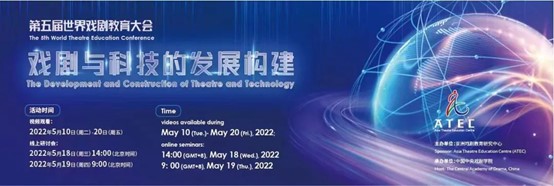
Two seminars were held online under the Conference respectively on 18 and 19 of May. Mr. Lv Yuzhong (Level I Bureau Rank Official, Department of Arts, Ministry of Culture and Tourism of the People's Republic of China) kicked off the event with his opening remark, in which he extended his congratulations on the Conference and reiterated the importance for theatre education to keep up with the times. He believed that artistic practitioners ought to follow new trends, deal with new problems, and explore new fields for the sustainable development of theatre education.
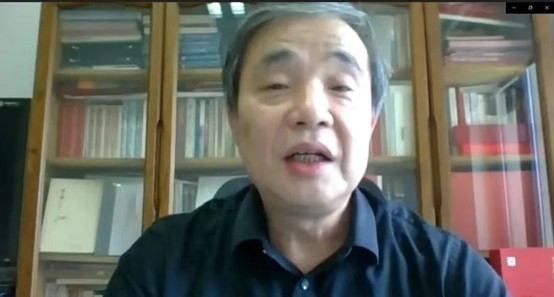
Mr. Lv Yuzhong Delivering A Speech
Then Prof. Tobias Biancone (Director-General International Theatre Institute) accentuated the significance of holding online seminars during the Pandemic in his speech, and stressedthe goal and spirit "to realize the full protentional of high-quality arts education, to positively renew educational systems, to achieve crucial social and cultural objectives, and ultimately to benefit all the people."
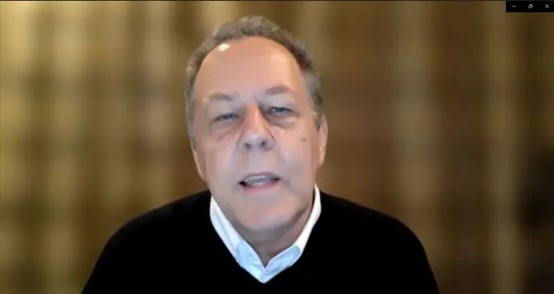
Prof. Tobias Biancone Delivering A Speech
Prof. Hao Rong (President of the Central Academy of Drama in China as well as ATEC Director-General) warmly welcomed all the guests both from China and abroad. He extended his interest in the creative and insightful ideas during the seminars that would boost the development of theatre education. His speech was followed by the messages from the representatives of ATEC member schools.
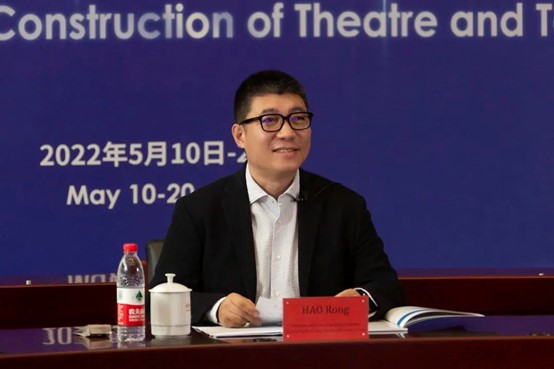
Prof. Hao Rong Delivering A Speech
Keynote Speeches
Before the seminars, Prof. Jayne Knowles (Dean of Performance) and Dr. Esther Armstrong (Programme Director for Performance Design and Technologies) from Wimbledon College of Arts were invited as keynote speakers. They shared about how they had cooperated with local communities and corporates for social equality and sustainable development, taking the practices in Wimbledon College of Arts as examples.
Prof. Hao Rong also delivered a keynote speech titles "Towards Another Peak of Theatre Art: Riding the Waves of the Convergence of Art and Technology". He cited the philosophy of "(to) go with the times" from "The Book of Changes" to analyze how traditional theatre arts should advance with the rapidly developing technologies and innovations, before touching upon how the convergence of the technology and arts had changed today's theatre education and production. He concluded that such convergence should essentially serve the creation of new works that marked the "peak" of the industry, and that the dissemination of these works required technology in turn.
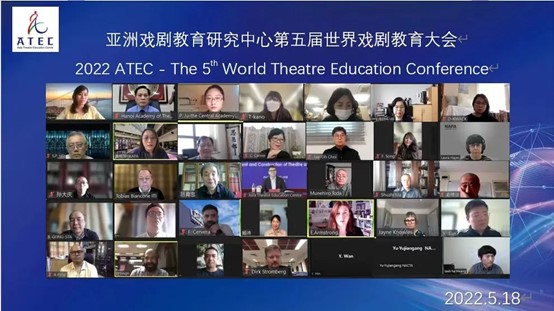
Screenshot of Participants
Seminars
The two day’s seminars were chaired respectively by Prof. Sun Daqing (the CAD’s Assistant President, Editor-in-Chief of ‘Drama’ the Journal), and Prof. Ma Shuzhi (Dean of Theatre Management, the CAD). The authors of the papers, along with the audience, were engaged into heated and fruitful discussions about theatre and technology, with the audience raising questions directly through video chat or typing in ZOOM’s chat box.
Prof. Ma Shuzhi enumerated the cases of applying digital information technology in performance, before exploring the possibilities of adopting digital and information technology in future performances. Dr. Abhilash Pillai from National School of Drama (India) offered more details and background knowledge for his paper ‘The Development and Construction of Circus Theatre with Technology Through Pedagogy in India’ during his session. Tsend-Ayush Turmunkh from Mongolian National University of Arts and Culture presented the status quos of modern Mongolian theatre, especially the application of the theories of Brecht (among other theatrical masters) and media technology in performances in Mongolian theatre. A team of 7 from LASALLE College of the Arts (Singapore) including Prof. Steve Dixon showcased their practices of multiple new technologies in pedagogy featuring VR, telematics, etc., which attracted many questions from the audience.
With three keywords, "modern technology, innovation, and talent cultivation", Prof. Ji Pei from the Central Academy of Drama (China) elaborated on her dialectical thoughts over the use of modern technology in cultivating innovative students of theatre art. Both Dr. Sun Xiao from National Academy of Chinese Theatre Arts (China) and Kwack Da-won from Chung-Ang University (Korea) quoted their teaching practices, to respectively substantiate the impact of convergence media on lighting design and sound design. Zhang Yang from National Academy of Chinese Theatre Arts (China) provided his solutions to such problems as updating the expression form of traditional Chinese theatre and the inheritance of such arts, apart from his reflection on the co-development of traditional theatre arts and technology.
Prof. Song Zhen from the Central Academy of Drama (China) put forward the concept of "digital theatre", a new form of drama that combined intelligence technology and theatre art, the essence of which was the study of humanity, according to Song. Xu Bo from National Academy of Chinese Theatre Arts (China) talked about his theory of bringing theatre art back to "presence", citing Paul Levinson's three-stage model of technical media development from the latter's book "Theory of Anthropotropic Media Evolution". Dr. Nguyen Thi Thanh Van from Hanoi Academy of Theatre and Cinema (Vietnam) offered her advice on and approaches to the protection and promotion of traditional Vietnamese theatre arts, such as (Tuong, Cheo, Cai Luong). Prof. Sean Yang Wang from Shanghai Theatre Academy (China) introduced the convergence of multiple training methods for acting in modern times for teaching basic acting skills, before he discussed with the audience about the new and tradition acting methods from the East and the West.
At the end of the Conference, ATEC General Secretary Toda Munehiro extended his gratitude towards the host and all attendees, and his wish for vis-à-vis reunion in the near future.
As always, all the speeches and papers by the guest speakers and scholars will be complied into a conference proceeding, this year's version to be titled as "The Development and Construction of Theatre and Technology". As an important theoretical achievement in Asian theatre education study, the proceeding is expected to contribute to the sustainable development of theatre art around the world in a post-Pandemic era.

